The production of goods using forced labor remains an issue around the world. U.S. Customs and Border Protection (CBP) has made clear that they will continue to prioritize forced labor enforcement. CBP is the only U.S. government agency, and one of the few in the world, with the legal authority to take action against goods produced with forced labor to prevent entry into domestic commerce.
What is Forced Labor?
Forced labor is defined under 19 U.S.C. § 1307 as "all work or service which is exacted from any person under the menace [threat] of any penalty for its non-performance and for which the worker does not offer himself voluntarily." Forced Labor is the third most lucrative illicit trade, behind only drugs and weapons, and has an annual trade value of roughly $150 billion.
Right now, over 40 million people around the world are victims of some type of forced labor, including modern slavery, human trafficking, child labor, etc. Section 307 of the Tariff Act of 1930 (19 U.S.C. 1307) prohibits the importation of all goods and merchandise mined, produced, or manufactured wholly or in part in any foreign country by forced labor, convict labor, and/or indentured labor under penal sanctions, including forced child labor.
CBP is responsible for preventing the entry of products made with forced labor into the U.S. market by investigating and acting upon allegations of forced labor in supply chains. CBP implements Section 307 of the Tariff Act of 1930 (19 U.S.C. 1307) through issuance of Withhold Release Orders (WRO) and findings to prevent merchandise produced in whole or in part in a foreign country using forced labor from being imported into the United States.
UFLPA
On June 21, 2022, the Uyghur Forced Labor Prevention Act (UFLPA) was enacted to further reinforce the United States' prohibition against the importation of goods made with forced labor. The UFLPA establishes a rebuttable presumption that goods mined, produced, or manufactured wholly or in part in the Xinjiang Uyghur Autonomous Region of China or by an entity on the UFLPA Entity List are prohibited from importation into the United States under 19 U.S.C. § 1307.
In many ways, the UFLPA heightened the standard for forced labor compliance in comparison to its predecessor / parallel enforcement system, Withhold Release Orders. However, if an Importer of Record can demonstrate by clear and convincing evidence that the goods in question were not produced wholly or in part by forced labor the Commissioner of CBP may grant an exception to the presumption.
What Importers Should Do
In September 2017, CBP published an updated forced labor Reasonable Care Checklist that includes 12 questions importers must be able to answer in order to demonstrate they have used reasonable care. Key to this checklist is knowing "how your goods are made, from raw materials to finished goods, by whom, where, and under what labor conditions."
Map & Document Your Supply Chain
Understanding who is supplying you with a product is not enough, you also need to know who is supplying them. You should have a comprehensive understanding of your supply chain that includes documentation of the various tiers of suppliers. Detailed documentation can help identify gaps and high-risk areas that may need to be revisited down the road.
At a minimum, you should maintain the following information:
- Detailed description of your supply chain including all stages of production
- A list of suppliers involved in each step of the production process
- Contact information for all suppliers
- Documentation that can be used to trace raw materials to merchandise
- Manufacturing or production records
- Reports on factory conditions including reports on site visits
- Reports showing that the volume of inputs matches the volume of outputs for merchandise produced
The documentation process can also help you defend your reasonable care duty down the road should you face a CBP enforcement action.
Write Standards and Penalties Into Your Contracts
Suppliers may not always be as invested as you in being diligent about discovering forced labor. Contracts should stipulate compliance with forced labor laws and ideally include a code of conduct that promotes continual due diligence. You can also write your contracts with suppliers in a way that imposes large financial penalties or allows for termination if they use vendors who are discovered to be using forced labor.
Step Up Screening for Partners
You cannot rely on a supplier's word as your compliance strategy. Every importer should have a robust screening process that ensures, at a minimum, that trading partners are not subject to sanctions or embargoes. Importers should consider partnering with research firms that compile watch lists that government agencies won't or can't.
Utilize Technology
As supply chains become more complex, gaining visibility and maintaining transparency can seem overwhelming. Technology can help. There are several responsible sourcing software providers and managed services providers that can help you collect data, understand where your products come from, and organize your documentation. There are also free resources to help you understand documented risks, such as the U.S. Department of Labor's Sweat & Toil app.
Audit Your Supply Chain
Continual monitoring is a key part of preventing forced labor. Supply chains can change frequently, and you may never know about it if you don't perform audits.Audits should include data collection that can uncover compliance lapses, transparency gaps, and new risk. It is also critical to set up an audit reporting and remediation process so that you can quickly action items uncovered in an audit.
Contact Us
Diaz Trade Law has significant experience in a broad range of import compliance matters including forced labor compliance and enforcement mitigation. For assistance in a broad range of forced labor compliance matters including developing or updating a forced labor compliance plan, forced labor compliance training, or communicating with CBP regarding goods detained by CBP, contact us today atinfo@diaztradelaw.com.
More information on forced labor:
- UFLPA Guidance: What Importers Need to Know
- Uyghur Forced Labor Prevention Act (UFLPA): What You Need to Know
- Bloomberg Law: U.S. Customs Targets the Use of Forced Labor
- CBP Publishes Additional Guidance On Responding to Cargo Detentions Made Under the Uyghur Forced Labor Prevention Act
- Summary of CBP's March 2023 Forced Labor Technical Expo
- UFLPA DHS Forced Labor Guidance – What Importers Need to Know
- Uyghur Forced Labor Prevention Act (UFLPA): What You Need to Know
- CBP's Forced Labor Process Flowchart
The content of this article is intended to provide a general guide to the subject matter. Specialist advice should be sought about your specific circumstances.

